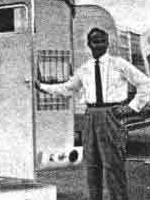
Tire pressure on HF trailer
6 posts
• Page 1 of 1
Tire pressure on HF trailer
My Hf trailer manual says "60 psi required" for tire pressure. Was wondering if the 60 psi requirement is needed to handle the weight rating of 1450 lbs or do the tires have to be inflated that much to make them safe no matter what weight you are hauling. What tire pressures lower than the 60 psi requirement have you run your HF trailer with no problems and no excessive treadwear and such. I'd like to be able to run with a bit lower tire pressure to smooth out the bumps. Thanks for your responses. 

Lookin' up in da skize with ize on da prize
http://home.earthlink.net/~g.teague/
http://home.earthlink.net/~g.teague/
-

GeorgeT - The 300 Club
- Posts: 319
- Joined: Wed Oct 20, 2004 1:21 pm
- Location: Austin and Gomorrah
Frank could better answer that question, but I believe that trailer tires are designed for very heavy loads, hence the high pressure ratings.
With our lightweight teardrops and ttts, we can use automotive tires rather than trailer tires, and we can reduce the pressure to keep it from bouncing around like a jack rabbit.
Eariler today there was a thread on reducing tire pressure... I'm in agreement with that!
Mike...
With our lightweight teardrops and ttts, we can use automotive tires rather than trailer tires, and we can reduce the pressure to keep it from bouncing around like a jack rabbit.
Eariler today there was a thread on reducing tire pressure... I'm in agreement with that!
Mike...
The quality is remembered long after the price is forgotten, so build your teardrop with the best materials...
-

mikeschn - Site Admin
- Posts: 19202
- Images: 475
- Joined: Tue Apr 13, 2004 11:01 am
- Location: MI


 I could see a 12 inch tire breaking loose from the rim on a boat trailer hauling a heavy boat. I think the little 12 inch tires on these HF trailer based tears should be able to hold up at 30-35 psi with such a light load even going over bumps when the sidewalls are most likely to flex the most. Maybe if you's goin' off road a lot you'd need to keep the pressure up, but then you probably shouldn't be messin' with little skinny tires anyway.
I could see a 12 inch tire breaking loose from the rim on a boat trailer hauling a heavy boat. I think the little 12 inch tires on these HF trailer based tears should be able to hold up at 30-35 psi with such a light load even going over bumps when the sidewalls are most likely to flex the most. Maybe if you's goin' off road a lot you'd need to keep the pressure up, but then you probably shouldn't be messin' with little skinny tires anyway.